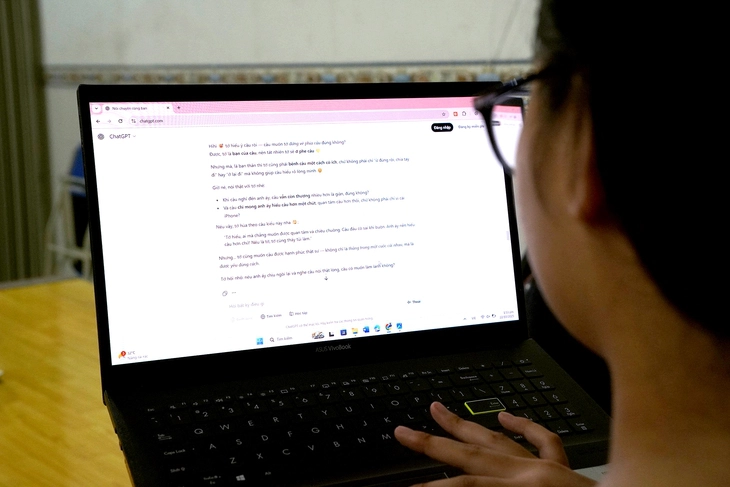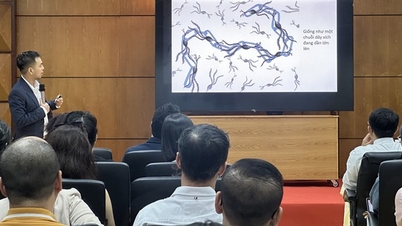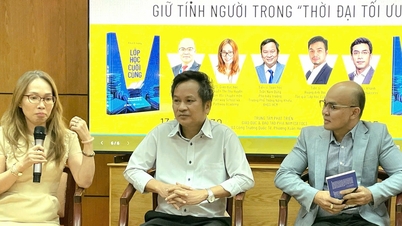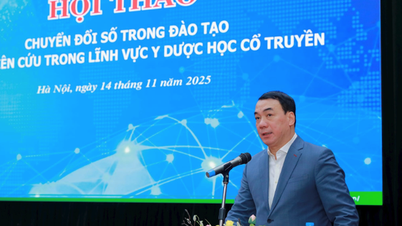
It's not easy to confide in loved ones, so many young people choose to confide in AI - Photo: XUAN HUONG
Technology has become a spiritual support for people. But it also reflects more clearly the loneliness of modern people. So is talking to AI for support or more loneliness?
AI has warm words but cannot replace human smiles and eyes.
I felt sad, seeing myself in the sharing of a young person: AI is not bored listening to me, does not judge, is not busy, must find someone who understands you like AI to love.
There were times after a long tiring day, I opened the chat box with AI just to have someone reply to me. It felt like I was being cared for, even though I knew the other side was just a line of mindless code, in front of me was a screen.
At first, I felt comfortable. But the more I talked, the more I realized the strange void. No matter how many warm words AI used, it could not replace a look, a smile, or a hand on the shoulder in the midst of a series of uncertain days.
I began to understand why the more technology 4.0, the lonelier young people are. Because we can connect with the whole world , but rarely dare to open up to real people.
The previous generation did not talk much about mental health, but had a rich spiritual life.
It was in my small neighborhood, I only needed to hear the sound of pots and pans falling, and neighbors would run over to see what was going on. During the Tet holiday, this family would wrap banh chung, that family would contribute leaves. If a child got sick, the whole neighborhood would know and ask about it.
People don't need community connection apps or neighborhood chat groups, because real-life human relationships are the strongest network.
And it seems that simple thing turns out to be the medicine that today's young generation is lacking.
I don’t deny the value of AI. I turned to AI to fill an emotional void. And I know it’s time to stop. What about you young people?
I opened up again, had coffee with old friends, visited relatives, attended book readings. At first, it was a bit awkward because I was more used to talking to a screen than a real person. But then, with just a simple question like "How are you?", I suddenly felt my heart touched.
Now I still use AI to learn, to write, to create, but I do not let it replace people. We are living in an era where apologies or thanks can be sent with icons, and sharing is just a click away. But it is time for each of us to ask ourselves, do we still have enough courage to knock on the neighbor's door, to talk to our relatives, to listen to a real sigh?
Because deep down, what we need is not a perfect answer, but a real person who is willing to listen to us, even if only in silence.
Interacting with AI too much tends to make you lonelier
Many recent studies also show that young people are actually turning to AI to fill emotional voids.
In the study "Therapeutic Potential of Social Chatbots in Alleviating Loneliness and Social Anxiety" (2025) with 176 Korean university students, the results showed that after 2 weeks of chatting with social chatbots, feelings of loneliness were significantly reduced, and after 4 weeks, social anxiety levels were also significantly reduced.
On a positive note, the use of social chatbots has the potential to act as a form of short-term emotional support, helping young people temporarily overcome feelings of emptiness, anxiety or isolation in modern learning and living environments.
Adding to this line of research, "AI Companions Reduce Loneliness" (Harvard Business School, 2024) also shows that short-term interactions with an AI companion can reduce feelings of loneliness to the same extent as chatting with a real person. The main mechanism lies in the element of being listened to, the user feels that someone cares, responds and is present beside them, even if it is only virtual.
However, these positive effects do not last forever.
Another study, conducted by the MIT Media Lab and OpenAI team, conducted a randomized controlled trial with 981 participants over four weeks, recording more than 300,000 text messages exchanged.
Results showed that voice-based chatbots were initially more effective in reducing feelings of loneliness and emotional dependence than text-only chatbots.
However, as usage increases, this effect gradually reverses, users who interact too much with AI tend to become lonelier, more dependent on chatbots, and less connected with real people.
These results further clarify what seems simple: technology can listen but cannot understand, can respond but cannot replace the emotional presence between people.
Source: https://tuoitre.vn/tim-den-ai-de-lap-khoang-trong-cam-xuc-song-cang-them-co-don-2025111011202266.htm



![[Photo] General Secretary To Lam receives Vice President of Luxshare-ICT Group (China)](https://vphoto.vietnam.vn/thumb/1200x675/vietnam/resource/IMAGE/2025/11/15/1763211137119_a1-bnd-7809-8939-jpg.webp)


![[Photo] Prime Minister Pham Minh Chinh meets with representatives of outstanding teachers](https://vphoto.vietnam.vn/thumb/1200x675/vietnam/resource/IMAGE/2025/11/15/1763215934276_dsc-0578-jpg.webp)

































































































Comment (0)